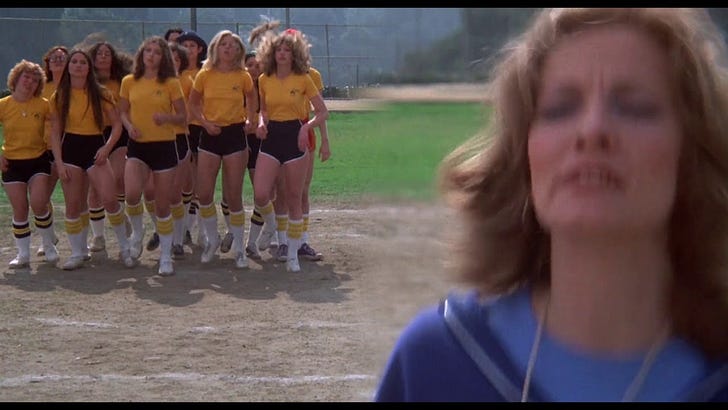Sunday Matinee #17 Carrie
Good morning, Dear Reader, R-Rated Movie Club is all up in your DMs. Writing about movies and theology has been a blast and having subscribers like you tells me there’s a desire to seek the sacred in the secular out there. This week, we review the poll results from earlier this month. Thanks for participating!
Audience Reaction Results
Two weeks ago, readers were asked to sift through the winners of multiple Best Picture polls to find the ultimate winner. We took the top 5 vote getters of R-rated and PG-13 rated nominees, from both the free newsletter available to everyone and the bonus content for paid subscribers, and made a united poll.
Who takes home the Oscar this time, when we narrow the field from 10 to 5?
Everything Everywhere All at Once takes home the Oscar yet again! It won here in both polls, plus in “real life.” Wait, isn’t this also real life? Maybe it’s a part of the multiverse and we just don’t know it yet.
Honestly, I’m not surprised. I know this movie isn’t for everybody but those who enjoy it have a strong feeling about it. When I look at all 5 pared-down nominees, I think that’s true for each of them. Call it confirmation bias (“This is confirmation bias.”) but I don’t know anyone who doesn’t either love or hate each of these movies. While people love what they love, I have seen some people intensify their dislike of a movie in the face of “too much” love from the public. I’ve been there. I think I was there with The Matrix for a long time. But I like to think I’m not, either. After all, do we really need more hate in the world, and over art, no less? We need more love.
Quotes With Notes
Acts 7:56-60
Full Text: Acts 7:55-60 (Revised Common Lectionary)
5th Sunday of Easter (May 7, 2023)
Sign up for a free course at EnterTheBible.org to learn more.
Context: Over the last few weeks, we’ve seen the birth of the church in Acts 2. Skipping ahead to Acts 6, we see Stephen, sent out by the earliest Christian community to teach to the crowds. He is not well-received, however. He begins teaching and people challenge him. Then, he speaks of their collective, shared past and calls them out for not having new vision. Here, he points to a new future, and something terrible happens.
56 “Look,” he said, “I see the heavens opened and the Son of Man standing at the right hand of God!” 57 But they covered their ears, and with a loud shout all rushed together against him. 58 Then they dragged him out of the city and began to stone him, and the witnesses laid their coats at the feet of a young man named Saul. 59 While they were stoning Stephen, he prayed, “Lord Jesus, receive my spirit.” 60 Then he knelt down and cried out in a loud voice, “Lord, do not hold this sin against them.” When he had said this, he died.
Carrie (1976) | Red Bank Films, United Artists
Starring Sissy Spacek, Piper Laurie, Amy Irving, Nancy Allen, Betty Buckley, William Katt, John Travolta
Written by Lawrence D. Cohen, Stephen King (novel) | Directed by Brian De Palma
Context: A group of teenage girls move from bullies to terrorists when a classmate is confused and scared during her first period. As a consequence, their PE instructor keeps them after school for grueling workouts. If they skip out, they miss prom. The group reluctantly goes with it, except for Sue Snell. She’s had enough.
Chris Hargenson: She can't get away with this. I'm gonna get her.
Sue Snell: Let it go, Chris.
Chris Hargenson: Like Hell, I will!
Commentary:
The early stories of the first Christians are told in Acts of the Apostles. Readers get a continuation of some of the disciples from the gospels, the origin story of Paul (seen here in this passage as Saul), and some history of how this new faith spread throughout the land. In the midst of this story is Stephen, who only appears in Acts 6 and 7. That’s because he’s killed in Acts 7. He’s a footnote of an Apostle compared to Simon Peter or Paul. But he certainly has more spotlight on the page than even some of the original twelve disciples, such as James the Less or Simon the Zealot. But he has a tremendous impact on those around him.
When the crowds and authorities feel threatened by stories of the new faith that Stephen teaches, they ask him how he knows this is true. He goes all the way back to the writings of Genesis and their forefathers, up through Moses and th Exodus. He observes that not everyone believed in Moses, that there were “stiff-necked people.” Then, he calls them “stiff-necked people.” Have you ever tried that? It doesn’t go very well, does it? Calling someone out for being obtuse is a lot like telling someone to calm down: they’re not going to see it your way.
After he is murdered, Stephen is mentioned in scripture three more times, each of them in Acts. The first is in the next chapter, Acts 8, when the community laments his martyrdom and bury him, in Acts 11 to explain why people had scattered in fear after he was killed, and Acts 22 when Paul confesses he was there “while the blood of your witness Stephen was shed.” Again, a footnote of a figure compared to Simon Peter, Paul, or even Philip who has some spotlight in the Gospel of John but really gets to shine here in Acts. Yet page time (like screen time in the movies) does not equal impact. Stephen’s bravery, his death, and his memory clearly make an impact on the community - including Saul in his faith conversion and new identity as Paul.
In the movie Carrie, we see a school run by popularity politics. That leaves Carrie White (Sissy Spacek) as no more than a footnote to her classmates. Their cruelty is almost second-nature, and used strategically. Carrie stands in the back during a volleyball game, hoping no one notices her. The other team says hit it to Carrie, that will guarantee they’ll get the point and they’re right. When Carrie has her first period in the locker room shower and she doesn’t understand what’s happening due to her almost-cartoonishly conservative Christian mother, Margaret (Piper Laurie), they all make fun of her and pelt her with tampons and pads (“Plug it up! Plug it up!”). While they do take delight in their cruelty, even this is strategic. After all, some of them may think to themselves, better her than me.
Maybe it’s because Miss Collins (Betty Buckley) grabs her and tries to shake some sense into her during the bullying incident, or maybe she has a stronger constitution, or maybe guilt is doing it’s thing, but Sue Snell (Amy Irving) does try to repent. She goes along with the calisthenics consequence and when Chris Hargenson (Nancy Allen) has a fit, she calls her out on it. Have you ever tried that? It doesn’t go very well, does it? Chris walks off the field, kicked out of prom, and begins hatching her scheme of revenge - a scheme that will eventually turn Carrie White from footnote to defining moment in her classmates’ soon-to-be short lives.
In his memoir On Writing, Stephen King explains that he never fully trusted Sue Snell’s motivations in his novel for sending her boyfriend, Tommy Ross (William Katt), to the prom with Carrie. I did, though, at least in the film version of the character. I think she truly regrets how she treated Carrie and wants to do a new thing. Sue converts, Chris refuses. And when so many die after Carrie responds to Chris’s horrifying prank, we see this moment on the field as a pivot point for which way Chris could have gone.
Saul was there when Stephen was martyred. He held the murderers’ coats. He kept persecuting others. Until something finally made him stop - in his case, a vision of Jesus. He repents and it’s he who later brings up being at Stephen’s murder as part of his story. For Paul, Stephen is not a footnote, but a pivot point. What have been your pivot points on your faith journey? Where have you repented? What do you need to change?
Have an excellent day Dear Reader. May your life’s journey meet the heart of God in ways you can recognize and that are meaningful. And to today’s preachers, may worship be a blessing for you personally and may your sermon and prayers remind everyone that God loves all people. God’s peace and good movies to you!







